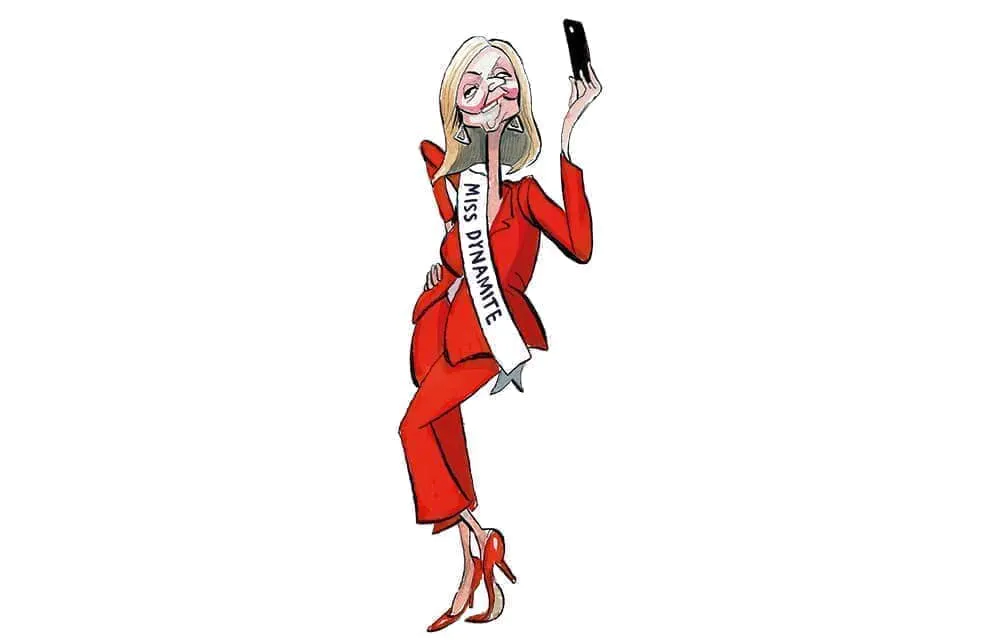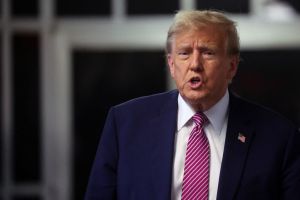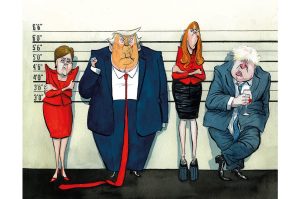Many Brits who’ve outstayed their welcome in the Old Country head across the Pond for pastures new and the chance of a fresh start. The Pilgrims, Thomas Paine, John Oliver. Could former prime minister Liz Truss be the next to follow that well-trodden path?
Since her astonishing fall from grace last September, when she managed just forty-four days as prime minister, Truss has found a couple of excuses to come to Washington. The latest DC think tank to welcome to the most impactful economic mind of the last decade is the Heritage Foundation, who had Truss give their 2023 Margaret Thatcher Freedom lecture on Wednesday morning.
The auditorium was three-quarters full when Truss took to the stage, in a Tory-blue dress, skin-tone heels and that much-speculated-about necklace. Her speech was perfectly tailored to an audience of American conservatives: she hit on hot-button culture war issues, was hawkish on China, and offered potshots at the Democrats and the left. “What sex you are, what race you are… those things are not so important,” she said. She decried the “imbuing of woke culture into our businesses” and slammed how advocates of ESG culture deployed a “diversity target or social target” to cut competitors out of the market. Truss singled out “defense industries” which suffered as they are “not deemed socially acceptable.” Won’t somebody please think of Northrop Grumman?!
The rapt audience at Heritage didn’t seem to be too concerned by what should have been the elephant in the room: the economic disarray triggered by Truss’s “mini-Budget” that led to her being the shortest serving British prime minister ever. Her first attempt to tell her side of the story came in a 4,000-word essay in the Sunday Telegraph in February. In it, she said she was “not claiming to be blameless,” but that “fundamentally I was not given a realistic chance to enact my policies by a very powerful economic establishment, coupled with a lack of political support.” She felt she shared the blame with “global economic uncertainty and changes to US rules.” Truss restated this case in her speech. “We faced coordinated resistance,” she said, from the IMF, President Biden and the UK’s Office for Budget Responsibility. Her appearance at Heritage suggested that, despite the nightmarish outcomes of her government’s actions, she is resolutely sticking by the principles: “Last autumn I had a major setback — but I care too much to give up on this agenda,” she said.
Her comments addressing the resistance her government faced came curiously close to her section on free speech and cancel culture. This made my ears prick up. Later that afternoon, when I caught up with Truss in a podcast studio between media hits, I asked her about it. Did she consider herself a victim of economic cancel culture?
“These things are related,” she said. “The limiting economic freedom, which is what we’re talking about here — because when the government is spending half of all the money in a country, that means people’s economic freedom is limited because they’re not spending their own money — I think that’s linked to people’s personal freedom being limited. You know what you can say, what you can challenge in a free society. I think those things are being limited.
“What I think we’ve seen is over a period of time, the left have successfully dominated institutions in our two countries. They’ve successfully dominated universities and the intellectual debate. So there are fewer free market economists in Britain than there were twenty years ago, I would argue. And the center of gravity has shifted to the left. And the same thing is true in many parts of the United States as well, particularly within the Beltway.”
The main policy objective Truss pushed was for America to reconsider their pullout from the Trans-Pacific Partnership. Were the US to join the deal that followed — the Comprehensive and Progressive Agreement for Trans-Pacific Partnership, or CP-TPP — that would prove to be a “fast-track route to a UK-US trade deal,” she said. The question of such a trade deal has followed Truss in the years since Brexit: she was secretary of state for international trade in 2019 under Boris Johnson. Later in the speech she criticized the Biden administration effort to implement a global tax rate: “We need a UK-US trade deal, not a UK-US tax deal.”
Truss thinks joining CP-TPP is of vital importance to US interests, “as an anti-China bulwark.” “What the US has done so far is a lot of security arrangements around the Pacific, but not enough economic engagement with the Pacific,” she said. “That was the whole purpose of TPP, is to actually say to countries, ‘we’re going to trade with you, we’re going to invest in you, so you don’t have to look to China as the alternative.’ It’s so important geostrategically that the US engages economically with the Pacific region.
“A very good byproduct, because the UK has signed up to the terms of TPP and because the US designed the terms of TPP, we should be able to do a trade deal as part of that, or off the back of that, very easily. It’s a no brainer.”
I pointed out that the former president Donald Trump, who is currently leading in the 2024 polls, is the leader who pulled America out of TPP. Should primary candidates be asked about recommitting to CP-TPP as we head into an election year? “Yes.”
“I want to see a dynamic US. I want to see a lower tax US. I want to see a US with less government intervention and subsidies. What I want to see is… things like the Inflation Reduction Act, which is actually a £400 billion subsidy program. I want to see that type of policy abandoned. I want to see the OECD minimum tax policy abandoned because that’s just about making the whole Western world high tax, high spend and low growth. And if we don’t do that, I think there’s just going to be further stagnation, further low growth, and it’s going to embolden China.
“What I want to see in the US presidential election next year is a candidate, stroke candidates putting forward a vision for how they’re going to make the West dynamic again. We need a strong, economically dynamic US that is going to engage with the rest of the world and pull them away from the Chinese sphere of influence. That’s what we need. So I’ll back any president who’ll do that.”
The last twelve months have seen a changing of the guard for female leaders. Sanna Marin has just been beaten in an election in Finland. Jacinda Ardern has resigned in New Zealand and of course, the end of the Truss prime ministership. Did she see a trend pattern there? Was there a different treatment of female leaders, as far as scrutiny of their appearance, their sex lives, their social lives, in contrast with male leaders?
“I don’t think Nicola Sturgeon and I have got much in common in terms of our politics,” Truss replied. “You’re falling into the identity politics trap of thinking what group somebody in is more important than their opinions, ideas or capabilities.
“I do think there’s a reality that women politicians face a different type of scrutiny. There’s definite evidence that female politicians have faced worse abuse online for example, et cetera, et cetera. So there is a different way in which people are treated. But I don’t think the answer to that is to single out women politicians and say ‘this is part of a trend.’ I don’t think it is. I am very opposed to affirmative action and quotas because that to me is identity politics.”
One trend in politics Truss is comfortable discussing, on both sides of the Atlantic, is the rise of progressivism. Intriguingly, the former prime minister thinks the pandemic, and policies in response to it, played a role in boosting it.
“I think lockdown had a huge impact,” she said. “I think in Britain we’d already seen a leftward shift of views, but I think it was exacerbated by Covid and lockdown.”
Why, I asked, because everyone’s spending more time on the internet?
”No, because it’s limiting people’s freedom. We can argue whether that was the right or wrong thing to do. But by limiting people’s freedom, you created a world in which the government had more power over people. And we’re living with the aftermath of that.”
So in Covid-23 or whatever the next pandemic is, does Truss think lockdowns are a likelihood in the UK?
“I don’t think we should do it again, no.”
With that, Truss headed in for her next TV hit. I mentioned to her and her press secretary that Reason, the libertarian magazine, were having a party that evening, and texted them the details. That night, ninety or so gathered at Reason’s Dupont Circle offices, drinking their free beer and listening to two of their editors debate whether cats or dogs were more libertarian. Sure enough, at a little past 8:30, the former prime minister arrived, with her husband Hugh and two teenage daughters in tow.
In an instant, she was swarmed by well lubricated political fanboys, eager for a moment with a world leader, no matter how fleeting. “Prime Minister, can we take a picture?” asked a mustachioed young gent in a cowboy hat. “In that hat? Really?” Truss replied, smiling and posing. The clamor, you would think, strikes a stark contrast from how a crowd would receive her back home. You got the sense that she could get used to this.


















